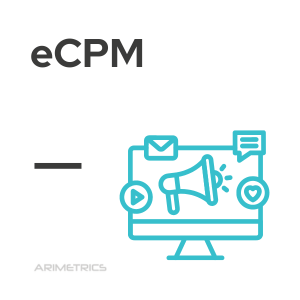Definition
The eCPM, for its acronym “effective cost per mile”, is a metric used in digital advertising that measures the effectiveness of an advertising campaign. In essence, eCPM indicates how much money an advertiser pays for every thousand ad impressions, regardless of the payment model (pay per click, pay per impression, etc.).
How eCPM is calculated
The calculation of the eCPM is done using the following formula: total revenue / total number of impressions x 1000. For example, if a website generates €1000 and has 5000 ad impressions, its eCPM would be €200. This metric is especially useful for comparing the profitability of different ad campaigns, ad formats, or ad placements on the page.
It should be noted that eCPM does not necessarily measure the effectiveness of an advertising campaign in terms of conversion or ROI (return on investment), as it does not take into account the number of clicks or conversions that occur from ad impressions. However, it is a valuable tool for advertisers and publishers to understand the value of their advertising inventory, as well as to optimize their pricing and ad distribution strategies.
Difference between eCPM and CPM
Advertisers and publishers need to know the value of their ad inventory, but it can be difficult to compare different campaigns or formats.
Traditional CPM (cost per thousand) only measures how much an advertiser pays per thousand impressions, without taking into account other factors such as clicks or conversions. This makes it difficult to accurately measure the effectiveness of a campaign.
The eCPM (effective cost per thousand) is a metric that takes into account all relevant factors when measuring the performance of an advertising campaign. It calculates total revenue divided by the number of impressions multiplied by 1,000, giving advertisers and publishers more accurate information about which campaigns are most profitable. With eCPM, they can make better pricing decisions and distribution strategies to maximize ROI.
